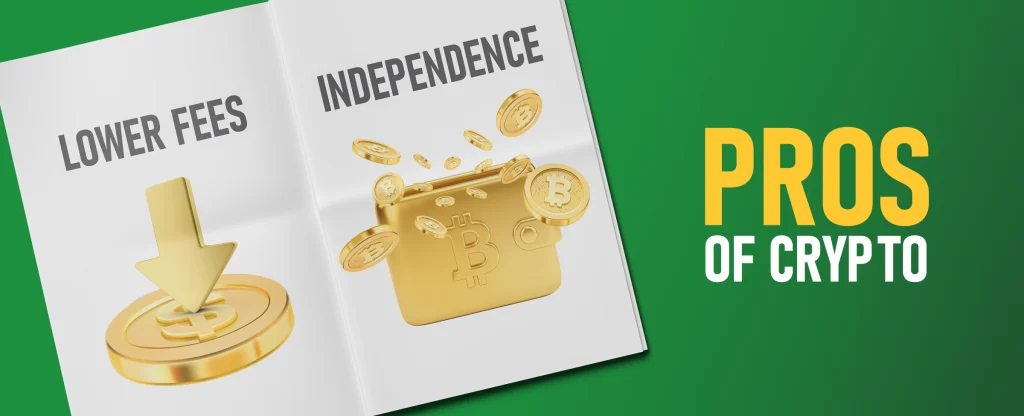Cryptocurrency is one of the most talked-about investments over the last ten years. Whether it’s Bitcoin, Ethereum, Dogecoin or the latest altcoin making waves, us Aussies are increasingly curious about what crypto can offer. But hang on… is it just hype? Or is there something real behind the vibe?
If you’re wondering whether to dip your toes into the crypto market, you’re not alone. From friends raving about overnight gains to headlines about market crashes, it can all feel a bit overwhelming. But fear not as the team here at Joe Fortune are on hand to help you look past the noise, crypto has some unique traits that are worth considering along with a few red flags to keep in mind. In this easy-to-read guide, we’ll walk you through the main reasons why people invest in crypto, the pros and cons, and help you figure out if it fits your goals, risk tolerance, and lifestyle.
The Pros and Cons Explained
Like any investment, crypto isn’t all good or all bad; it simply depends on how you approach it. So, let’s break down both the advantages and the drawbacks so you can make an informed choice.

Pros of Crypto
Accessibility
One of the biggest appeals of crypto is how easy it is to get started. Unlike traditional investments where you might need a broker or to fill out piles of paperwork, all you need to buy crypto is an internet connection, an app or exchange such as CoinSpot, Swyftx, or Binance, and of course a few Aussie dollars.
You don’t need to be rich to get involved. Many platforms let you buy small fractions of a coin, so if Bitcoin is trading at $50,000, you can still get in with just $10 or $20. That makes crypto far more accessible than things like real estate or shares in major companies. For Australians, it’s also easier than ever to deposit using local payment methods like PayID, POLi, or bank transfer, with platforms catering specifically to the Aussie market.
Lower Fees
Compared to traditional banks or investment brokers, crypto trading can be cheaper. There are no middlemen in decentralised systems, so transaction fees are usually lower especially for international transfers. For example, if you want to send money overseas, using crypto can be far cheaper than using a bank or services like Western Union. That’s a big draw for people who want a faster, more cost-effective way to move money across borders. Even within Australia, you’ll often find fewer sneaky fees when trading or transferring crypto especially if you’re doing it through a peer-to-peer platform or wallet-to-wallet.
Independence
Crypto gives you more control over your own money. You’re not relying on a bank or government to approve transactions, hold your funds, or limit access. This level of financial independence is one of the core reasons crypto was created. If you hold your crypto in a private wallet (not on an exchange), you’re the only one with access to it. That’s a powerful feeling for many people who are tired of dealing with traditional financial systems.
In countries with unstable currencies or strict capital controls, crypto has become a financial lifeline. While Australia doesn’t have those issues, the idea of holding an asset outside the traditional banking system still appeals to many as does using it to play in
High Potential for Returns
Let’s not sugarcoat it. Most people get into crypto because they’ve heard about the gains.
And yes, the potential returns can be huge. Bitcoin has gone from being worth a few cents in 2010 to tens of thousands of dollars. Ethereum, Solana, and other altcoins have also delivered eye-watering returns for early investors. But you must remember, with high potential returns comes high risk. We’ll get to that in the cons section further down. Still, for Aussies looking to diversify their portfolios or explore more speculative assets, crypto has rightly earned a place on the map.
Transparency
Thanks to blockchain technology, crypto transactions are recorded publicly and can’t be changed once confirmed. This offers a level of both transparency and accountability that’s not always present in traditional finance. Anyone can view transaction histories, wallet balances, and activity on most public blockchains. While this doesn’t mean you can see personal identities (wallets are pseudonymous), it does allow for more open and auditable systems particularly in decentralised finance (DeFi).

Cons of Crypto
Volatility
If you’re after a stable investment, crypto might not be for you as prices can rise or fall dramatically in a very short amount of time. One tweet from Elon Musk, or a sudden regulatory change can cause the market to plunge or rally within hours if not minutes! For example, Bitcoin has seen 60% drops and 350% gains all in the same year. That kind of volatility can be stressful, especially for newer investors who aren’t used to seeing their portfolio swing wildly.
If you invest in crypto strap yourself up and be ready for a rollercoaster and of course don’t invest more than you’re willing to lose.
Adapting Regulations
Crypto exists in a bit of a legal grey area in many countries, and Australia is no exception. While the Australian Tax Office (ATO) has provided guidance on how crypto is taxed (yes, you’ll likely pay capital gains tax when you sell), regulations are still evolving. This means there’s some uncertainty around how crypto will be treated in future whether that’s in terms of taxation, privacy, consumer protections, or restrictions on certain coins or services. It’s not necessarily a deal-breaker, but it does mean that as an investor you need to stay informed and understand that regulation could impact future performance or access.
Storing on a Private Key May Mean You Lose Everything
One of the major selling points of crypto is being in full control of your funds, this can also be a major risk. If you store your crypto in a personal wallet using a private key, you alone are responsible for keeping that key safe. Lose it, and you lose access to your funds. There’s no forgotten password button, and no customer service team who can help.
It’s estimated that millions of dollars in Bitcoin have been lost forever because people forgot or misplaced their private keys. For some people, this level of responsibility is empowering but for others, it’s terrifying. To stay safe, many Aussies use a combination of hot wallets (online, more convenient) and cold wallets (offline, more secure) and keep backup copies of their seed phrases stored securely, we suggest this ideally is offline and of course never shared.
Bottom Line: Is Crypto a Good Investment?
So, should you invest in crypto… As with many such questions there’s no one-size-fits-all answer. Yes, crypto offers unique benefits, like low barriers to entry, financial independence, and potentially huge gains. But… It also comes with serious risks; volatility, regulation changes, and the real possibility of losing your investment if you’re careless with security.
If you’re a younger investor, tech-savvy, and comfortable with risk, adding a small percentage of crypto to your portfolio could make sense. It might help you diversify and give you exposure to one of the most innovative (and fast-moving) areas in finance. On the other hand, if you’re close to retirement or prefer low-risk, stable investments, crypto might not suit your goals. Or, at the very least, it should be approached very cautiously. Here are a few tips if you’re thinking about getting started:
- Stay secure. Use trusted platforms and secure your private keys and passwords properly.
- Understand tax obligations. The ATO treats crypto as property, so you may need to report gains.
- Expect volatility. If your investment drops 30% in a day, you shouldn’t panic. That’s how the crypto cookie can crumble before rebuilding.
- Start small. Don’t invest more than you’re willing to lose.
- Do your research. Learn about the coins you’re buying and not just what’s trending on social media.
Top Tip: Crypto isn’t a golden ticket to wealth, but for the right person with the right strategy, it can be an exciting and potentially rewarding part of a diversified investment plan.
Final Thoughts
If you’re still unsure, it might be worth speaking with a financial adviser, especially one familiar with digital assets before jumping in. Crypto can be fun, fast, and full of opportunity, but like any investment, it’s best approached with your eyes wide open.
